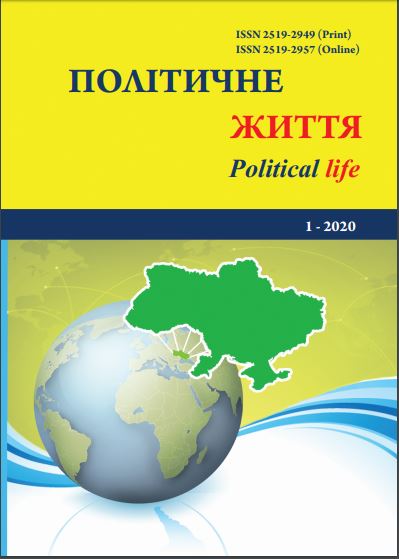Broadening the Opportunities for Reaching Gender Equality in Politics in the Context of Power Decentralization in Ukraine.
DOI:
https://doi.org/10.31558/2519-2949.2020.1.6Keywords:
decentralization, gender equality, electoral code, gender quota, gender stereotypesAbstract
The process of decentralization is multi-sided and difficult. The transfer of authority requires a higher productivity and efficiency levels from the communities. Together with introduction of decentralization, the role of local self-government bodies increases as they become the primary and likely most important body that is responsible for the welfare and capacity levels of their community. Projects and programs of international technical support play an important role in reform implementation as they provide advisory, expert, organizational and financial support. In addition, they pay special attention to the gender issue, as they believe that it is one of the crucial ones for ensuring sustainable development of the state. The purpose of this article is to analyze how the decentralization processes influenced the dynamics of the gender issue development, specifically in the context of opportunities for political participation of women in the life of the society in general and their community in particular. The 2015 Law of Ukraine “On Local Elections” was the first Law, which introduced a “gender quota”, namely, not less than 30 percent of representatives of one sex in the party list. However, there were no requirements as to the place of these candidates in the list and no sanctions were presupposed for violating the observation of this quota. The Electoral Code that was enacted on January 1, 2020 also presupposes a 30 percent gender quota, in addition, the Code states that the candidate lists in the multi-mandate electoral constituencies in the administrative-territorial units that have over 90,000 voters, should have not less than 2representatives of each sex for every five positions in the list.Unlike the Law of 2015, the new Electoral Code includes gender requirements into the procedure of submitting the candidates. And violation of the procedure leads to refusal of registration. Thus, for the first time there are sanctions for violating gender balance in party lists. This, in turn, stimulated the involvement of a greater number of women in the political and decision-making processes in the community. Decentralization processes have a positive influence on involvement of communities in general and of active women in particular in the decision-making process, stimulate the “bottom-up” promotion of gender equality, thus creating a corresponding sociocultural vision and value orientations in the society.References
Європейська Хартія місцевого самоврядування. URL: http://zakon5.rada.gov.ua/laws/show/994_03.
Геннадій Зубко. Збільшення представництва жінок в органах місцевого самоврядування має стати трендом. URL: https://www.kmu.gov.ua/news/zbilshennya-predstavnictva-zhinok-v-organah-miscevogo-samovryaduvannya-maye-stati-trendom-gennadij-zubko.
Закон України «Про місцеві вибори». URL: https://zakon.rada.gov.ua/laws/show/595-19.
Результати гендерного моніторингу в рамках діяльності ВГО «КВУ» «Ґендерний моніторинг та сприяння фактичній ґендерній рівності на місцевих виборах 2015 року в Україні». URL: http://www.cvu.org.ua/eng/nodes/view/type:news/slug:2015%D0%BF%D0%BF%D0%BF%D0%BF%D0%BF
Скільки жінок серед нардепів, міністрів, мерів та голів сільрад. // Інформаційний ресурс «Слово і Діло». URL: https://www.slovoidilo.ua/2018/03/08/infografika/polityka/skilky-zhinok-sered-nardepiv-ministriv-meriv-ta-holiv-silrad.
Виборчий кодекс України. URL: https://zakon.rada.gov.ua/laws/show/396-20.
Тамара Марценюк. Найпопулярніший стереотип це те, що жінка – «Берегиня» і «Барбі». URL: https://gurt.org.ua/interviews/31236/

